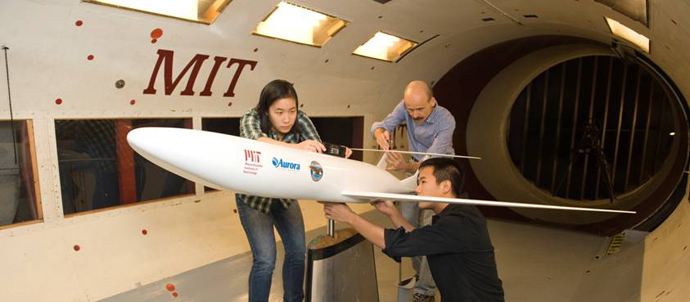
Professor Mark Drela and students Nina Siu and Michael Lieu prepare an AeroAstro design for a super-efficient commercial airliner for testing in MIT's Wright Brothers Wind Tunnel. (Photo by William Litant/MIT, used with permission.)
Featured Courses
Professors, students, and researchers come to MIT from all corners of the globe to explore their passion for air and space travel and to advance the technologies and vehicles that make such travel possible.
We build on our long tradition of scholarship and research to develop and implement reliable, safe, economically feasible, and environmentally responsible air and space travel.
Our industry contributions and collaborations are extensive. We have graduated more astronauts than any other private institution in the world. Nearly one-third of our current research collaborations are with MIT faculty in other departments, and approximately one-half are with non-MIT colleagues in professional practice, government agencies, and other universities. We work closely with scientists and scholars at NASA, Boeing, the U.S. Air Force, Stanford University, Lockheed Martin, and the U.S. Department of Transportation.
Our educational programs are organized around three overlapping areas:
Aerospace information engineering
Focuses on real-time, safety-critical systems with humans-in-the-loop. Core disciplines include autonomy, software, communications, networks, controls, and human-machine and human-software interaction.
Aerospace systems engineering
Explores the central processes in the creation, implementation, and operation of complex socio-technical engineering systems. Core disciplines include system architecture and engineering, simulation and modeling, safety and risk management, policy, economics, and organizational behavior.
Aerospace vehicles engineering
Addresses the engineering of air and space vehicles, their propulsion systems, and their subsystems. Core disciplines include fluid and solid mechanics, thermodynamics, acoustics, combustion, controls, computation, design, and simulation.
Aeronautics and Astronautics Courses
Archived Aeronautics and Astronautics Courses
Some prior versions of courses listed above have been archived in OCW's DSpace@MIT repository for long-term access and preservation. Links to archived prior versions of a course may be found on that course's "Other Versions" tab.
Additionally, the Archived Aeronautics and Astronautics Courses page has links to every archived course from this department.










